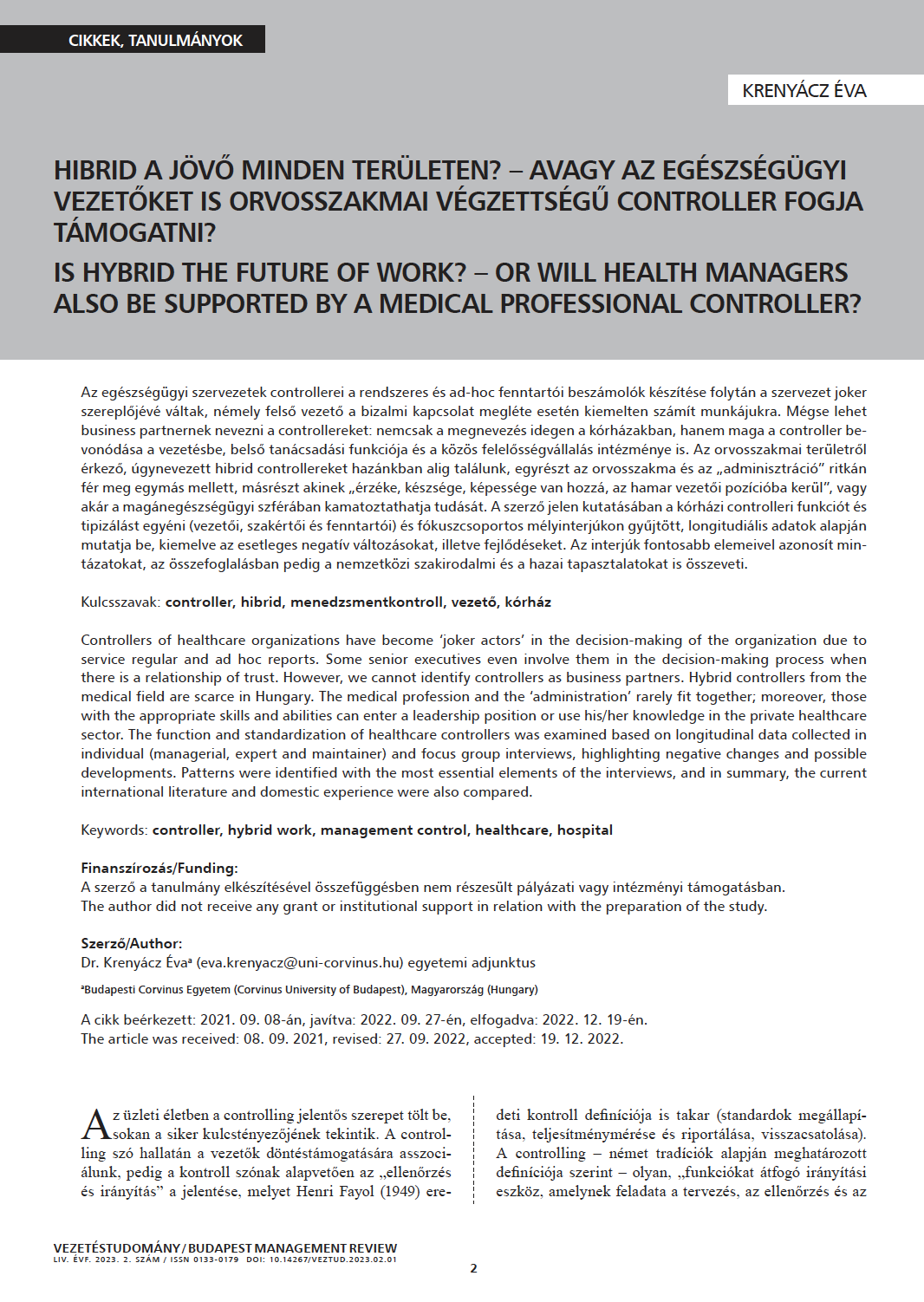Hibrid a jövő minden területen?
Avagy az egészségügyi vezetőket is orvosszakmai végzettségű controller fogja támogatni?
DOI:
https://doi.org/10.14267/VEZTUD.2023.02.01Kulcsszavak:
controller, hibrid, menedzsmentkontroll, vezető, kórházAbsztrakt
Az egészségügyi szervezetek controllerei a rendszeres és ad-hoc fenntartói beszámolók készítése folytán a szervezet joker szereplőjévé váltak, némely felső vezető a bizalmi kapcsolat megléte esetén kiemelten számít munkájukra. Mégse lehet business partnernek nevezni a controllereket: nemcsak a megnevezés idegen a kórházakban, hanem maga a controller bevonódása a vezetésbe, belső tanácsadási funkciója és a közös felelősségvállalás intézménye is. Az orvosszakmai területről érkező, úgynevezett hibrid controllereket hazánkban alig találunk, egyrészt az orvosszakma és az „adminisztráció” ritkán fér meg egymás mellett, másrészt akinek „érzéke, készsége, képessége van hozzá, az hamar vezetői pozícióba kerül”, vagy akár a magánegészségügyi szférában kamatoztathatja tudását. A szerző jelen kutatásában a kórházi controlleri funkciót és tipizálást egyéni (vezetői, szakértői és fenntartói) és fókuszcsoportos mélyinterjúkon gyűjtött, longitudiális adatok alapján mutatja be, kiemelve az esetleges negatív változásokat, illetve fejlődéseket. Az interjúk fontosabb elemeivel azonosít mintázatokat, az összefoglalásban pedig a nemzetközi szakirodalmi és a hazai tapasztalatokat is összeveti.
Letöltések
Hivatkozások
Anthony, R. N., & Govindarajan, V. (2009). Menedzsmentkontroll-rendszerek. Budapest: Panem Könyvkiadó.
Anthony, R. N., & Young, D. W. (2003). Management control in non-profit organizations. New York: Irwin.
Baran, W. (2013). Management accounting in the implementation of management control in healthcare organizations. Zeszyty Teoretyczne Rachunkowości, 72(128), 7-31. https://doi.org/10.5604/16414381.1063609
Bodnár, V., Révész, É., & Horváthné Varga Polyák, Cs. (2011). Kontrolling az egészségügyben [E-book]. Budapest: Semmelweis Egyetem.
Bodnár, V. (2004). Mit is ért(s)ünk kontrolling alatt? Interdiszciplináris Magyar Egészségügy, 3(1), 14-18.
Bogt, H. T., van Helden, J., & van der Kolk, B. (2016). New development: Public sector controllership— reinventing the financial specialist as a countervailing power. Public Money & Management, 36(5), 379-384. https://doi.org/10.1080/09540962.2016.1194086
Byrne, S., & Pierce, B. (2007). Towards a more comprehensive understanding of the roles of management accountants. European Accounting Review, 16(3), 469-498. https://doi.org/10.1080/09638180701507114
Bunget, O. C., & Brînduşe, A. I. (2019). Connection Between Controlling Department and Management – Premise for Achieving Organizational Objectives. The Audit Financiar Journal, 17(4), 680-688.
Dózsa, Cs. L. (2010). A kórházak stratégiai válaszai a változó környezetre – Magyarországon a 2000-es években (Doktori értekezés). Budapest: Budapesti Corvinus Egyetem. http://phd.lib.uni-corvinus.hu/550/1/dozsa_csaba.pdf
Fayol, H. (1949). General and industrial administration. New York: Pitman.
Goretzki, L., Strauss, E., & Weber, J. (2013). An institutional perspective on the changes in management accountants’ professional role. Management Accounting Research, 24(1), 41-63. https://doi.org/10.1016/J.MAR.2012.11.002
Henzler, H. (1974). Der Januskopf muss weg! Wirtschaftswoche, 38, 60–63.
Horváth P. (2008). Controlling. Út egy hatékony controllingrendszerhez. Budapest: CompLex Kiadó.
ICV–IGC (Internationaler Controller Verein – Internatinal Group of Controlling) (2012). The Essence of Controlling – The Perspective of the Internationaler Controller Verein (ICV) and the Internatinal Group of Controlling (IGC). Journal of Management Control, 23, 311–317. https://doi.org/10.1007/s00187-013-0168-0
Hyvönen, T., Järvinen, J., Pellinen, J. & Rahko, T. (2009) Institutional Logics, ICT and Stability of Management Accounting, European Accounting Review, 18(2), 241-275. https://doi.org/ 10.1080/09638180802681511
Järvinen, J. (2006). Hybridization and the professional roles of management accountants in the health care sector. A Field Study. In 4 th International Conference on Accounting Auditing and Management in Public Sector Reforms. Siena, Septembre.
Järvinen, J. (2009). Shifting NPM agendas and management accountants’ occupational identities. Accounting, Auditing & Accountability Journal, 22(8), 1187-1210. https://doi.org/10.1108/09513570910999283
Karlsson, B., Hersinger, A., & Kurkkio, M. (2019). Hybrid accountants in the age of the business partner: exploring institutional drivers in a mining company. Journal of Management Control, 30(2), 185-211. https://doi.org/10.1007/s00187-019-00280-1
Körmendi, L., & Tóth, A. (2011). A controlling alapjai. Budapest: Saldo Kiadó.
Krenyácz, É. (2015). A hazai egészségügyi intézmények kontrolling-rendszere. Statisztikai Szemle, 93(8-9), 823-843. https://www.ksh.hu/statszemle_archive/2015/2015_08-09/2015_08-09_823.pdf
Krenyácz, É. (2017). A kórházi kontrolling paradoxona ‒ felemelkedés és/vagy devalválódás? Vezetéstudomány, 48(8-9), 22-34. https://doi.org/10.14267/VEZTUD.2017.09.03
Krenyácz, É. (2018a). Controlling in Hungarian hospitals: History and key issues. Society and Economy, 40(4), 605-622. https://doi.org/10.1556/204.2018.40.4.8
Krenyácz, É. (2018b). Use of management information in hospital decision-making. Vezetéstudomány, 49(5), 2-12. https://doi.org/10.14267/VEZTUD.2018.05.01
Kurunmaki, L. (1999). Professional vs financial capital in the field of health care – struggles for the redistribution of power and control. Accounting, Organizations and Society, 24(2), 95-124. https://doi.org/10.1016/S0361-3682(98)00030-0
Kurunmaki, L. (2004). A hybrid profession: the acquisition of management accounting expertise by medical professionals, Accounting, Organizations and Society, 29(3-4), 327-347. https://doi.org/10.1016/S0361-3682(02)00069-7
Kurunmaki, L., Lapsley, I., & Melia, K. (2003). Accountingization vs legitimation: a comparative study of the use of accounting information in intensive care. Management Accounting Research, 14(2), 112-139. https://doi.org/10.1016/S1044-5005(03)00019-2
Merchant, K. A., & Van der Stede, W. A. (2007). Management control systems: Performance measurement, evaluation and incentives. Harlow: FT/ Prentice Hall.
Musinszki, Z. (2012). Kontrolling alapjai. Miskolc: Miskolci Egyetem.
Pettersen, I. J., & Nyland, K. (2006). Management and control of public hospitals – the use of performance measures in Norwegian hospitals. A case‐study. The International Journal of Health Planning and Management, 21(2), 133-149. https://doi.org/10.1002/hpm.835
Szukits, Á. (2016). Menedzsmentkontroll rendszerek és a controller szervezeti szerepe (Doktori értekezés). Budapest: Budapesti Corvinus Egyetem. https://doi.org/10.14267/phd.2017035
Szukits, Á. (2017). A controlleri szakma hazai középvállalatokban – Mennyiben meghatározó a felsővezető vezetési stílusa? Köz-gazdaság, 12(5), 215-229.
Szukits, Á., & Bodnár, V. (2019). A költségelemzéstől az adathasznosításig–a hazai vállalatok által használt controllingeszközök alakulása az elmúlt ötven évben. Vezetéstudomány, 50(12), 112-121. http://doi.org/10.14267/ VEZTUD.2019.12.10
De Loo, I., Verstegen, B. & Swagerman, D. (2011). Understanding the roles of management accountants. European Business Review, 23(3), 287-313. https://doi.org/10.1108/09555341111130263
Weber, J. (2011). The development of controller tasks: explaining the nature of controllership and its changes. Journal of Management Control, 22(1), 25-46. https://doi.org/10.1007/s00187-011-0123-x
Zünd, A. (1978). Zum Begriff des Controlling – Ein umweltbezogener Erklärungsversuch. In Goetzke, W. – Sieben, G.: Controlling – Integration von Planung und Kontrolle (Vol. 4, pp. 15–26). Köln: GeberaSchriften.

Downloads
Megjelent
Hogyan kell idézni
Folyóirat szám
Rovat
License
Copyright (c) 2023 Vezetéstudomány / Budapest Management Review

This work is licensed under a Creative Commons Attribution 4.0 International License.
Authors assign copyright to Vezetéstudomány / Budapest Management Review. Authors are responsible for permission to reproduce copyright material from other sources.

